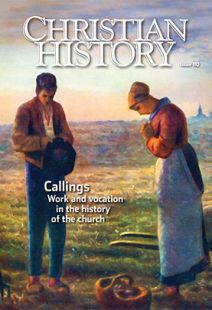Editor's note: Vocation
I GREW UP as the daughter and granddaughter of United Methodist pastors. In my house, we talked about calling a lot. Later, in college and graduate school, the language continued, but nearly always in the context of callings to the ordained ministry or at the very least to “full-time Christian service.”
Sometimes people struggled with that call: my own grandmother wrestled with whether marrying my grandfather would mean giving up on what she discerned, as an eager teenager, was a call to missionary service in a far-off country. She did marry him, and as pastor’s and Christian academic’s wife she labored long and fruitfully as a different kind of missionary much closer to home. But it did not look like the call she had been led to expect.
In or out?
I also heard much language about “finding God’s will for your life.” That will, it always seemed, was something quite precisely known by God, though only dimly discerned by humans, and it was something you could be “in” or “out” of, especially concerning the choice of a spouse and of a career. At the ripe old age of 29, spouseless, and on my third different career trajectory, I was fairly sure I was “out.” At the very least, it did not look like the call I had been led to expect.
I would have benefited immensely then from spending some time in the wise company of the Christians whose stories this issue tells. Our subject is the myriad ways that Christian ”vocation” or “calling” has been understood throughout Christian history. The words are really the same—“vocation” has a Latin root; “calling” an Anglo-Saxon one—and both have been used from Bible times to our own to describe the summoning of Christians. But that summoning has raised many questions over the years.
Can one have a vocation to “secular” work, or is the word limited to the ordained and the consecrated? How can you tell what God is calling you to do with your life, your job, and your relationships? Does calling mean abandoning those things or fulfilling them differently? Is “vocation” synonymous with “occupation”? What does calling look like in a largely Christian world? And what does it look like in a largely un-Christian world?
The questions have been many, and the answers have been varied. At times Christians have emphasized the call to religious work over the call to work in the world, and at times they have risen up against that assumption. At times they have claimed that there are some professions a Christian cannot hold and still be a Christian—and at times those professions have changed. At times they have understood their calling as building up the social order, and at times they have understood it as undermining the social order or tearing it down.
At their best, they have always remembered that the primary call on the life of all Christians is the call to follow Christ. At the somewhat riper age of 42, with a husband and two children—and a conviction that God can work through the life of a magazine and a magazine editor—that is a message I still need to hear.
Our brothers and sisters in this issue have much wisdom regarding following Christ even when it does not look like the call you have been led to expect. Read on, and let them tell you how. CH
Jennifer Woodruff Tait
Managing editor, Christian History
Correction: On p. 16 of issue 109, Dietrich Bonhoeffer’s death date was erroneously stated as 1943 instead of 1945. CH regrets the error.
By Jennifer Woodruff Tait
[Christian History originally published this article in Christian History Issue #110 in 2014]
Next articles
Gifts that differ; callings that unite
An interview with the editor of the Theology of Work Project
Will MessengerCalled First to Christ
Early Christians preached that coming to Christ changed everything
Beth Felker JonesReading scripture, washing feet
Benedict’s monastic Rule addresses both physical and spiritual aspects of the monastic calling
Benedict of NursiaPerpetua’s calling to Christ leads her to separate from her family
Excerpt from Perpetua’s martyrdom account
Perpetua



